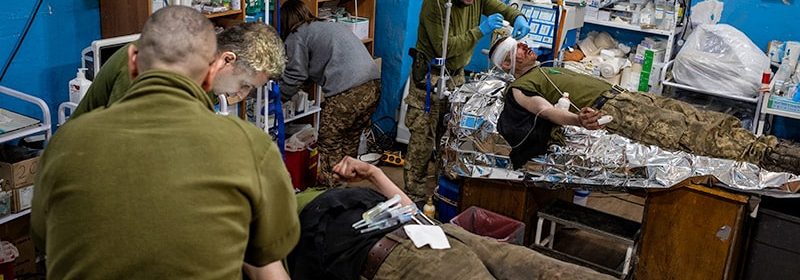The Wars Toll on Russias and Ukraines Healthcare Systems

“Destruction and Devastation: One Year of Russia’s Assault on Ukraine’s Health Care System” is the title of a report published in February by eyeWitness to Atrocities, Insecurity Insight, Media Initiative for Human Rights, Physicians for Human Rights, and Ukrainian Healthcare Center. These organizations documented that between February 24, 2022 — the day the Russian Federation began its full-scale invasion — and December 31, 2022, there were more than 700 attacks on Ukraine’s healthcare system. This total included 292 attacks that damaged or destroyed 218 hospitals and clinics (almost 9% of the country’s hospitals); 181 attacks on other healthcare infrastructure, such as pharmacies, blood centers, dental clinics, and research centers; 65 attacks on ambulances; and 86 attacks on healthcare workers, which led to 62 deaths and injured 52 persons, although these figures are probably underestimates. It would be difficult to consider these incidents as collateral damage or to think that these sites and individuals were hit by mistake, seeing as, for example, one facility — Severodonetsk Multiprofile Hospital in Luhansk — was hit ten times between March and May 2022.
At The Hague, the International Criminal Court is investigating Vladimir Putin for war crimes and crimes against humanity. The Russian president’s choices have brought to its knees not only the country that he invaded but his own country as well.
In recent months, many healthcare systems around the world have been directly and indirectly affected by a perfect storm that encompasses the pandemic, war, and the energy crisis. According to an article published in The Lancet, Russians are facing significant hardships and difficulties.
Medicines and medical equipment are not included in the sanctions packages that Western nations have imposed in response to the invasion of Ukraine. Still, there is a drug shortage in Russia, one that is much more severe than the one experienced in Europe in recent weeks. The flu season, which was longer and more intense than ever, has exacerbated the situation. During a meeting with government officials in late January, Putin himself acknowledged this situation. In Italy, people who have been able to stockpile have done so. The result? Shelves in pharmacies are emptier, and products are harder to come by.
Sanctions have complicated the logistics of and payment for medicine imports, while foreign producers in Russia have either reduced or stopped their operations. There is a shortage of advanced cancer drugs and drugs for rare diseases. In many cases, these medicine supplies were previously imported. Imports have been received from countries more friendly to Russia, such as India and China, but substantial shortages persist. Russia is trying to increase the proportion of medicine produced domestically to 88%. Currently, that proportion is 60%. Organizations are appealing to the United Nations to supply medicine for patients who need it.
Russians may also have to learn how to make do when it comes to medical equipment. Because of fears that sanctions will soon be imposed on the healthcare industry, health authorities are considering allowing medical institutions to repair equipment with nonoriginal spare parts and components. An infectious disease specialist who spoke to The Lancet on condition of anonymity said, “It will be like it was in Soviet times. Basic drugs and services available, but shortages of anything beyond that.”
Some patients have decided not to buy medicines because they need the money for other things, like food and rent.
The import problems have caused an increase in the prices of some drugs, including antibiotics, and have reportedly caused some clinics to halt procedures that rely on imported medicines, including arthroplasty and joint replacement procedures. So far, doctors say that a relatively small proportion of the population is affected. The Russian healthcare system has been in a state of crisis for years. In 2019, the Minister of Health, Veronika Skvortsova, commenting on the country’s medical infrastructure, stated, “No one has attempted any systemic changes since the late 1950s.” Even before the war, healthcare workers complained of poor conditions — pay was low, corruption was rife, and ministers admitted that reforms had failed.
Now that there is a war, along with sanctions, shortages of medicine, and increased drug prices, an already strained healthcare system is feeling the effects even more acutely. And according to another doctor The Lancet spoke with, the greater problem facing that system is low staff morale. Physicians have the qualifications and experience to work somewhere else, and many want to leave Russia, but they cannot. They have been banned from leaving, for they may be called up to serve as army medics. They know, too, that, were they to leave, there would be no one left to treat people.
This article was translated from Univadis Italy, which is part of the Medscape Professional Network.
Source: Read Full Article